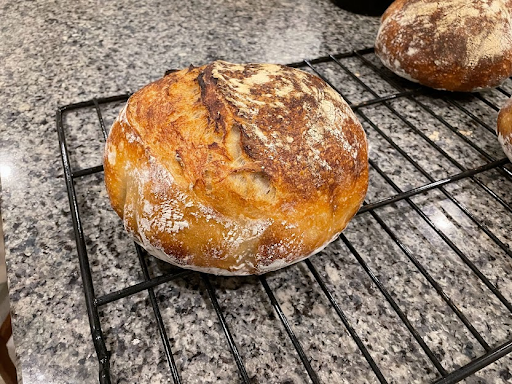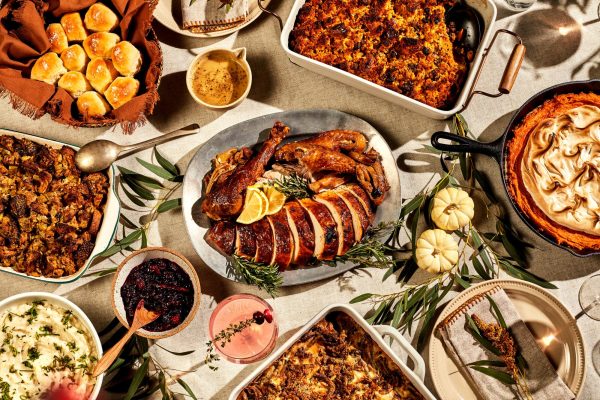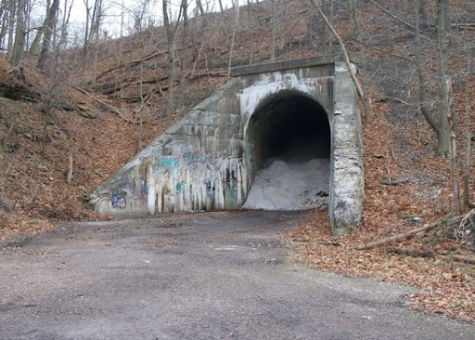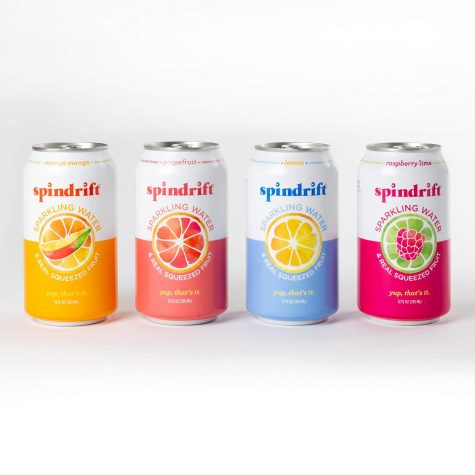My Journey into Sourdough

A loaf of sourdough bread fresh from my oven.
If you asked me what one of my hobbies was going to be a couple years ago, I never would have said baking sourdough bread. If I’m being honest, I didn’t even like eating it that much. However, everyone picked up something new during the pandemic, and for me, it was baking sourdough bread.
I had plenty of time on my hands, so when a close family friend offered my family some sourdough starter, the basis of every loaf of sourdough bread, I decided to take it and start baking. I had no idea that it was going to become one of my weekend routines.
I began baking bread without any experience, prior knowledge, or skills. All I did was search for sourdough bread recipes online, and clicked on the first one that came up. For using the recipe for the first time, the results were pretty good. The bread wasn’t bad, so I decided I would keep baking.
I did not take a course, go to a class, or get tips from an expert. I just kept baking, and the bread got better. After a while, it became something I did frequently. I wasn’t planning on baking bread for a long time. I mostly thought I’d stop once shops and grocery stores opened back up, and buying sourdough was back on the table, but once that happened, I realized that baking bread had evolved beyond just a means to an end. It wasn’t riveting or the most exciting thing in my life, but it was something to do and it was rewarding. Plus, homemade bread is delicious. When it comes out of the oven, it’s good even without anything on it. So I continued baking.
As I fell deeper and deeper into the sourdough bread rabbit hole, I began to realize just how unique it was. Not just in the ways that it differed from baking other breads, but in the ways it differed from baking as a whole. Baking usually requires precision. Precise measurements, precise quantities of ingredients, and a precise recipe, followed flawlessly. Even the slightest mistake can cost a baker hours of hard work.
Sourdough bread is different. In some ways it can be more challenging. With several stages of proofing lasting many hours each, failure when it comes to sourdough can mean days of progress down the drain, instead of just hours. And with the complexities and subtle differences in everybody’s starter, a recipe that works well for one person might lead to complete failure for another.
However, therein lies what makes sourdough bread truly special. The fact that there is no perfect recipe. There are no perfect steps to follow, or perfect quantities of ingredients to use. Initially it might seem frustrating when every set of instructions you look at is different. But what it really means is that you have to make the recipe yourself. You have to figure out what works and what doesn’t. At that point, the recipes are nothing more than guidelines or a general path to follow.
To some, this makes the prospects of baking sourdough bread even less appealing. Since a large part of success comes from trial and error, it’s easy for people to assume it will be a long time before they will get any decent results. But another reason sourdough bread is great is that it isn’t too punishing. Results definitely vary, and mistakes can make a loaf not quite as good as it could’ve been. However, it’s extremely rare that a loaf is completely ruined, especially if the mistake that was made was a minor one. Instead, baking sourdough bread is about improvement, and working towards baking the best loaf that you can.
While trying to hone my craft, I would often find myself looking for tips, tricks, or shortcuts, to get better. I did find some little things that I could do, but mainly I found out that the only real way to improve was to get better at the basics. This is because there really isn’t that much sourdough bread. There are four ingredients, and the steps basically boil down to mix the ingredients, knead the dough, wait for a while, and then bake. With a set of ingredients that simple, and a set of steps that basic, there really are no fancy tips or tricks to improving. The only way to make better bread is to get better at making bread. They may seem obvious, but in a world of quick fixes, life hacks, and shortcuts, it’s refreshing to have something so stripped back and straight forward.
As somebody who’s been baking bread with relative success for a while now, the most frequent questions I get from those who are starting to bake sourdough bread, or from those who just want to get better at it, are “What’s your secret?” or “What recipe do you use?” These questions always stump me, because most of the time I don’t really have an answer. I don’t have any secrets and I don’t use a specific recipe. But the more I think about it, the more I realize that the secret is that there are no secrets. So the best advice I, or anyone else can give, is to figure it out for yourself, because your sourdough bread experience is going to be unique to you.
Nate Chinman is a senior at Pittsburgh Allderdice High School. He enjoys creative writing as well as writing and editing for the school newspaper. Outside...







abe • Jun 18, 2022 at 12:55 am
slay
Sukanya Srinivasan • Jun 12, 2022 at 9:53 pm
Great article! I have some of Nate’s starter – now I need to work on my technique 🙂